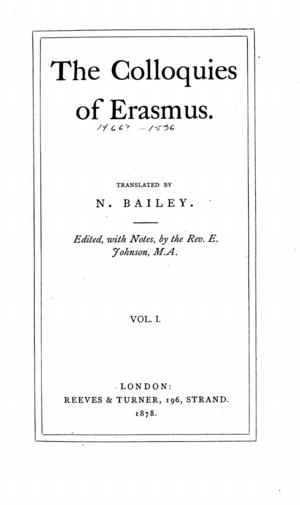
Part of: The Colloquies 2 vols. The Colloquies vol. 1
- Desiderius Erasmus (author)
- Nathan Bailey (translator)
- Rev. E. Johnson (editor)
In the guise of a school textbook on sound Latin prose Erasmus is able to mix sound language teaching, homilies on Christian ethics, and social criticism of some of the injustices and follies of his day.
Key Quotes
Food & Drink
Austin: And you, my Christian, that I may return the Compliment, seem to have been Scholar to Epicurus, or brought up in the Catian School. For what’s more delicate or nice than your Palate? Christian: Nor indeed would I myself, who am but an ordinary Man, change my Philosophy for Diogenes’s; and I…